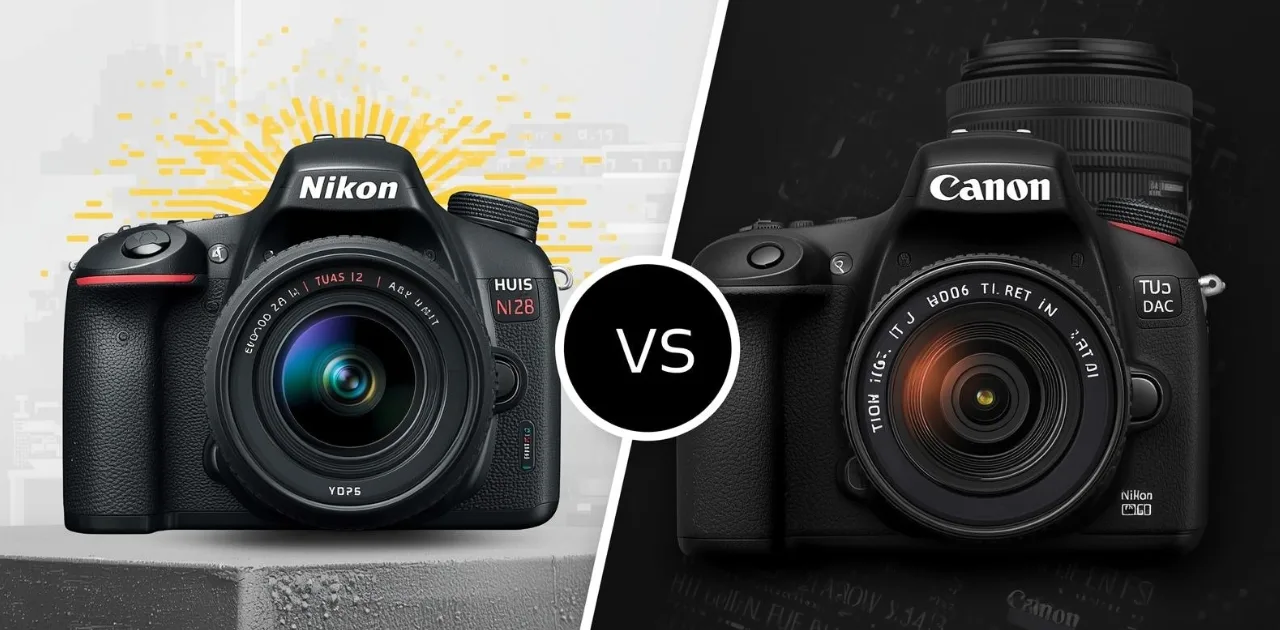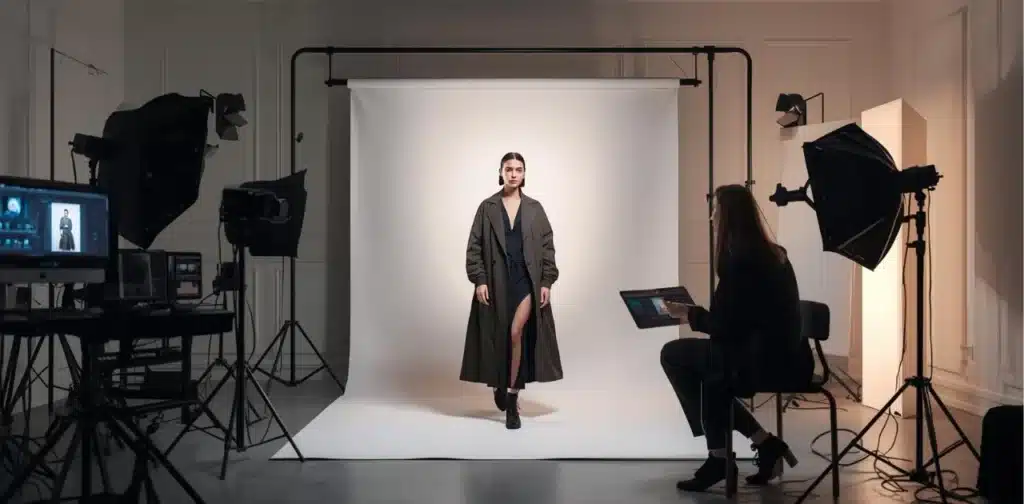Nikon and Canon have been rivals for a long time. Nikon began in 1917, and Canon followed in 1937. Nikon is loved for its clear photos and strong camera bodies. Canon is known for smooth video and beautiful colors. Today, in 2025, their fight is even stronger with new mirrorless cameras. Many people search for “Nikon vs Canon” or “Canon vs Nikon” to find out which one is best for them — whether they shoot weddings, travel photos, or videos.
This guide gives you simple and honest tips to help you choose. You will see clear comparisons of cameras, lenses, and prices. We will also look at popular models like the Nikon Z8 vs Canon R5. By the end, you will know which brand is right for beginners, pros, or anyone who wants great photos without wasting money.
Nikon vs Canon Overview: Brand Histories & Core Philosophy
Both Nikon and Canon have deep roots in the world of photography. Their long history shaped how people take photos today, and their philosophies reflect what photographers care about most. Understanding their backgrounds will help you see why nikon vs canon cameras remain a hot topic, even in 2025
Nikon’s History & Strengths
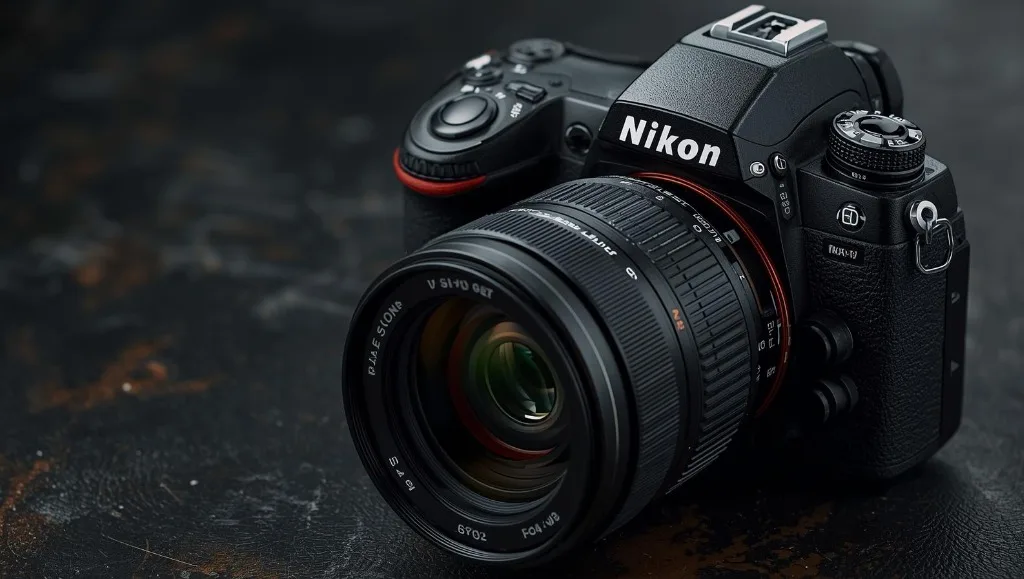
Nikon began its journey back in 1917 in Japan. The company first focused on optics, producing lenses that quickly earned global respect. Many photographers still praise Nikon for its sharp image quality and durable camera bodies.
What makes Nikon special:
- Expertise in optics – From early film cameras to today’s digital gear, Nikon has always been about precision.
- Professional-grade equipment – Many wildlife and sports photographers rely on Nikon for its fast, rugged cameras.
- Natural colors and depth – Known for producing lifelike tones, especially in outdoor photography.
Canon’s History & Strengths
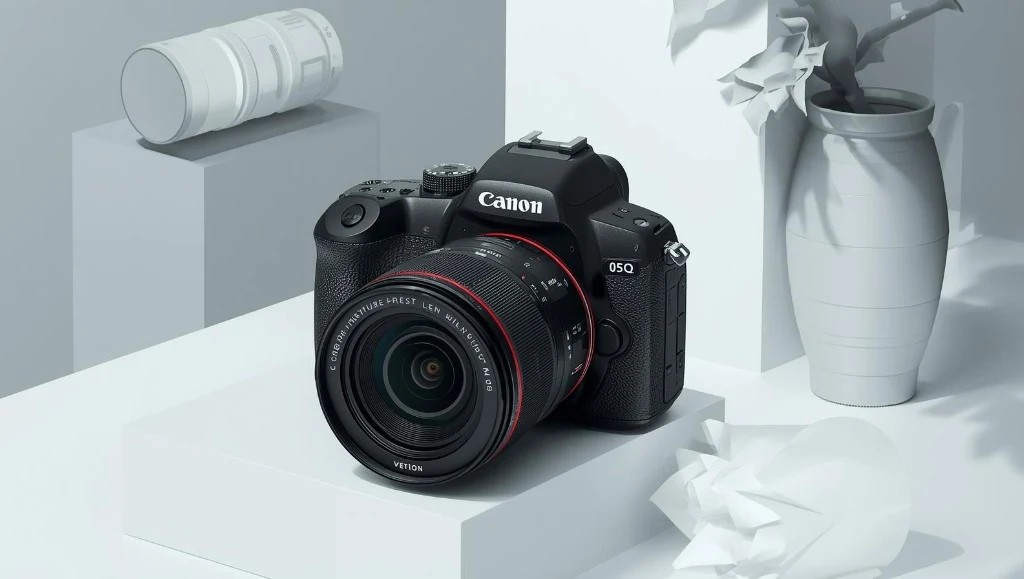
Canon started later, in 1937, but quickly rose to become a leader in camera technology. While Nikon built its reputation on optics, Canon became famous for innovation. It introduced many firsts in the industry, from advanced autofocus systems to smooth, high-quality video.
Why Canon stands out:
- Creative lens design – Canon offers one of the widest lens selections in the world.
- Video excellence – Many filmmakers and content creators prefer Canon for its cinematic results.
- Perfect for events – Wedding and commercial photographers love Canon for skin tone accuracy and reliable performance.
Brand Focus Comparison
Here’s a simple table to see how these two brands compare side-by-side:
| Feature | Nikon | Canon |
| Founded | 1917 | 1937 |
| Core Strength | Optics & image quality | Innovation & versatility |
| Best For | Wildlife & sports photography | Weddings & commercial photography |
| Video Capability | Strong but secondary focus | Industry-leading video performance |
| Lens Selection | Wide, but slightly smaller range | Extensive and highly diverse |
| Durability | Known for rugged builds | Reliable but lighter designs |
Both brands are powerful in their own ways. The decision often comes down to what matters most to you. Are you chasing wild animals through the jungle or capturing a couple’s happiest day? That answer may guide whether you lean toward nikon vs canon cameras or even canon vs nikon cameras for your next big investment.
Nikon vs Canon Cameras: DSLR vs Mirrorless in 2025
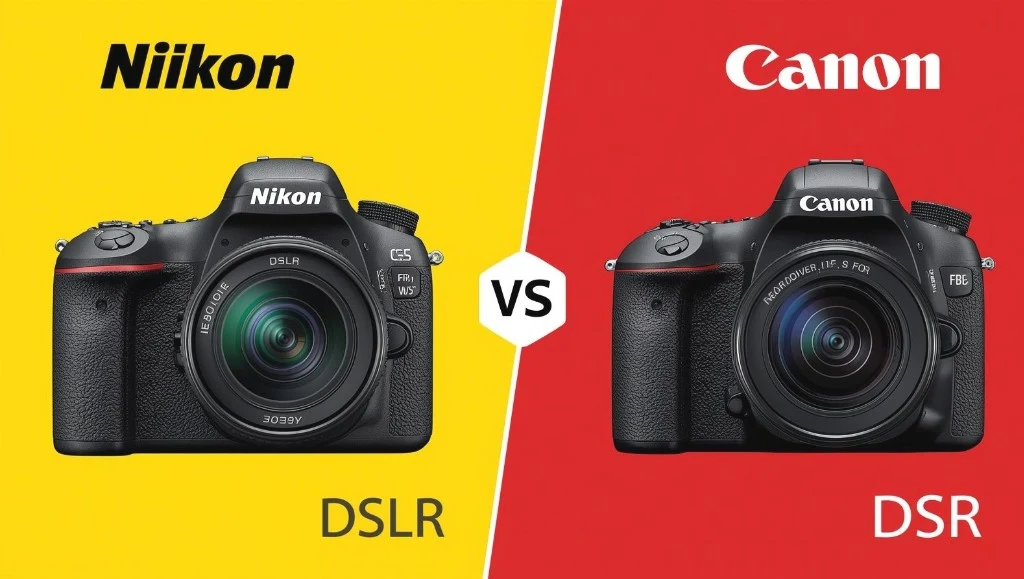
The battle of nikon vs canon cameras has been around for decades. Today, this battle continues with two main types of cameras, DSLRs and mirrorless systems. Each has unique strengths, and the right choice depends on your style, budget, and future plans.
Nikon vs Canon DSLR Comparison
DSLRs (Digital Single-Lens Reflex) have been trusted tools for years. Even though mirrorless cameras are gaining popularity, many photographers still prefer DSLRs for their reliability and battery life.
Which brand has the edge in DSLRs?
- Nikon is known for rugged builds and top-notch image quality. Its DSLRs often shine in outdoor and wildlife photography.
- Canon offers smooth color science and user-friendly controls, making it ideal for weddings and portraits.
Beginner vs Professional Models
Beginner-friendly options:
- Nikon D3500 – lightweight, easy-to-use, and affordable.
- Canon EOS Rebel T7 – perfect for new photographers learning the basics.
Professional-grade options:
- Nikon D850 – powerful autofocus and sharp image quality for pros.
- Canon 5D Mark IV – reliable for commercial and wedding work.
Nikon vs Canon Mirrorless Comparison
Mirrorless cameras are now the future. Smaller, lighter, and packed with modern tech, they are quickly replacing DSLRs in most markets. In 2025, both Nikon and Canon are focused heavily on mirrorless innovation.
Why Mirrorless is Dominating:
- No bulky mirror system, so cameras are lighter and quieter.
- Faster autofocus thanks to advanced on-sensor technology.
- Better video capabilities, including 4K and 8K recording.
- Constant firmware updates to improve features over time.
Nikon Z Series vs Canon R Series
- Nikon Z Series: Known for strong build quality and sharp Z-mount lenses. Models like Z8 and Z50 offer great performance at different price points.
- Canon R Series: Famous for excellent autofocus and video features. The Canon R5 and R6 Mark II are favorites among wedding and commercial photographers.
Quick Comparison Table
| Feature | Nikon DSLRs | Canon DSLRs | Nikon Mirrorless | Canon Mirrorless |
| Best Use Case | Wildlife & sports | Weddings & portraits | Outdoor & pro work | Weddings & commercial |
| Autofocus | Fast and precise | Smooth and accurate | Very fast, advanced tracking | Industry-leading AF |
| Video | Good but basic | Strong and reliable | 4K with strong quality | 4K & 8K with top features |
| Lens Range | Wide but fewer specialty | Widest DSLR lens range | Growing quickly | Large and expanding fast |
Both Nikon and Canon are excellent choices. If you want a traditional, reliable system, DSLRs still work well. If you want cutting-edge features and lighter gear, mirrorless is the clear winner. The decision between nikon vs canon mirrorless will depend on whether you value Nikon’s rugged design or Canon’s superior autofocus and video performance.
Popular Camera Models Compared Side-by-Side
Choosing between Nikon and Canon often comes down to comparing specific models. Below is a clear, easy-to-read table showing specs, pros, and cons for some of the most popular cameras in 2025. This section will help answer the question, “nikon vs canon which is better?”
Each match-up is designed to guide different types of photographers — from beginners to professionals.
|
Camera Matchup |
Specs Highlights |
Pros |
Cons |
|
Nikon Z8 vs Canon R5 |
45.7 MP, 8K video, 493-point AF vs 45 MP, 8K video, Dual Pixel AF |
– Nikon: Rugged build, sharp image detail – Canon: Incredible autofocus, perfect for video |
– Nikon: Fewer native lenses – Canon: Heats up in long 8K shoots |
|
Canon R6 Mark II vs Nikon Z6 III |
24 MP full-frame, 4K 60fps vs 24.5 MP full-frame, 4K 60fps |
– Canon: Reliable skin tones, smooth color – Nikon: Better grip, weather-sealed body |
– Canon: Battery life slightly shorter – Nikon: AF not as advanced as Canon |
|
Canon R5 Mark II vs Nikon Z8 |
45 MP, advanced video vs 45.7 MP, rugged pro body |
– Canon: Best for hybrid shooters – Nikon: Excellent for sports and wildlife |
– Canon: Expensive lenses – Nikon: Slightly heavier |
|
Nikon D850 vs Canon 5D Mark IV |
45.7 MP DSLR vs 30.4 MP DSLR |
– Nikon: Outstanding dynamic range – Canon: Smooth workflow for wedding photographers |
– Nikon: Bulkier body – Canon: Lower megapixels |
|
Nikon Z50 vs Canon R50 |
APS-C mirrorless, 20.9 MP vs APS-C mirrorless, 24.2 MP |
– Nikon: Strong low-light performance – Canon: Budget-friendly and light |
– Nikon: Limited lens selection – Canon: Build feels less durable |
|
Nikon Z5 vs Canon R8 |
Entry-level full-frame, 24.3 MP vs Entry-level full-frame, 24.2 MP |
– Nikon: Affordable for beginners – Canon: Faster burst shooting |
– Nikon: Slower burst rate – Canon: Limited IBIS (stabilization) |
|
Nikon Coolpix vs Canon Powershot |
Compact point-and-shoot cameras |
– Nikon: Simple for travel photography – Canon: Better video quality |
– Nikon: Limited manual controls – Canon: Higher price for top models |
|
Nikon D3500 vs Canon T7 |
Entry-level DSLR, 24.2 MP vs Entry-level DSLR, 24.1 MP |
– Nikon: Easy for first-time users – Canon: Strong community support and tutorials |
– Nikon: Fewer advanced features – Canon: Slower autofocus in live view |
How to Use This Table
Match your needs:
- Wildlife or sports? Check Nikon Z8 or D850.
- Wedding and portraits? Look at Canon R5 or R6 Mark II.
- Beginner? Consider Nikon D3500 or Canon T7.
Think long-term:
- Will you upgrade often? Mirrorless models like Nikon Z series and Canon R series are future-ready.
- Prefer stability and tried-and-true systems? DSLRs still have strong support.
Budget matters:
- Entry-level models like Nikon Z50 or Canon R50 give great value.
- Premium bodies like Nikon Z8 or Canon R5 Mark II are best for serious professionals.
Pro Tip:
Try before you buy, rent or test both brands first. One of our clients made the switch from Canon to Nikon after trying out a Z8 for wildlife photography. The grip and balance simply felt more natural in his hands. Sometimes comfort is just as important as the specs.
Nikon vs Canon Lenses & Accessories
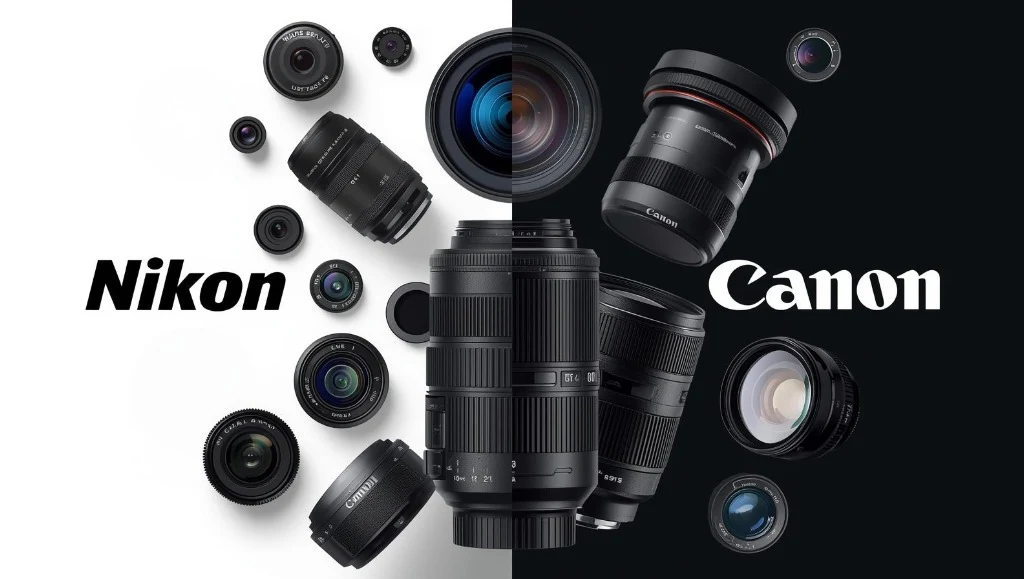
A great camera body is important, but the lens you use matters even more. Lenses shape the look of every photo and video. For many photographers, this is where the real debate begins, Nikon lens vs Canon lens.
Choosing the right system is not just about sharpness. It’s also about availability, price, and compatibility with your gear today and in the future.
Lens Variety and Quality
Both Nikon and Canon have been building lenses for decades, so their collections are massive. Each brand offers something special.
Nikon Lens Strengths:
- Known for natural color rendering and sharp optics.
- Rugged designs perfect for outdoor and wildlife photographers.
- Excellent telephoto and zoom lenses for sports and nature.
Canon Lens Strengths:
- Huge selection covering every need from portraits to cinema-quality video.
- Famous for fast prime lenses like the 50mm f/1.2 and 85mm f/1.2.
- Exceptional stabilization in many RF and EF lenses.
Availability & Price
- Canon currently has a slight edge in the number of mirrorless RF lenses.
- Nikon is catching up fast, releasing new Z-mount lenses every year.
- Entry-level lenses are priced similarly, but Canon often has more budget-friendly third-party options.
Compatibility
- Canon’s EF lenses can be used on RF mount bodies with an adapter.
- Nikon’s older F-mount lenses also work on Z-mount cameras using an FTZ adapter.
- If you already own several DSLR lenses, staying within the same brand will save you money.
Accessories Ecosystem
Cameras are more than just bodies and lenses. Accessories can make or break your shooting experience. Both brands offer excellent ecosystems, though there are some differences.
Common Accessories You’ll Need:
- Battery grips – Extend battery life and improve handling for vertical shots.
- External flashes – Essential for weddings, events, and studio setups.
- Camera straps and mounts – Comfort matters, especially for long shoots.
- Third-party gear – Includes gimbals, stabilizers, and wireless triggers.
Canon vs Nikon in Accessories
- Canon has slightly more third-party support, especially for flashes and video rigs.
- Nikon’s official accessories are built tough, perfect for rugged outdoor use.
Last talk:
If you focus on outdoor or action photography, Nikon’s rugged lenses and accessories will serve you well. Canon’s wider range and strong video support make it ideal for weddings, portraits, and hybrid shooters.
The choice isn’t only about nikon vs canon cameras , it’s about building a system that fits your vision and grows with you over time.
Use Cases – Which Brand Fits Your Needs?
Choosing between Nikon and Canon depends on what you want to shoot. Each brand shines in different ways. Below, you’ll find simple answers for common needs. This guide will help you decide which brand fits your style and budget.
For Beginners
Starting photography should feel fun, not confusing. Beginners need a camera that’s easy to learn and affordable.
Nikon for Beginners:
- Clean, simple menus that make learning easy.
- Strong low-light performance, great for night photos.
- Models like Nikon D3500 and Nikon Z50 are popular starter choices.
Canon for Beginners:
- Touchscreen menus that feel familiar, like a smartphone.
- A big range of low-cost lenses.
- Canon Rebel T7 and Canon R50 are top picks for first-time users.
Quick Tip:
Canon feels a bit easier for first-time photographers.Nikon gives you better grip and slightly sharper low-light shots.
For Wedding Photography
Weddings move fast, and you can’t miss a moment. You need a camera that’s quick, reliable, and makes people look their best.
Canon Strengths:
- Super-fast autofocus for capturing every moment.
- Beautiful skin tones, perfect for portraits.
- Lenses like the Canon 85mm f/1.2 create dreamy wedding shots.
Nikon Strengths:
- Excellent in low-light for dim reception halls.
- Rugged bodies built for long, demanding days.
Strong zoom options like the 70-200mm f/2.8.
Best Pick:
Canon is slightly better for weddings thanks to its autofocus and lens variety.
For Wildlife & Sports Photography
Wildlife and sports need speed, reach, and a tough body that handles bad weather.
Nikon Strengths:
- Fast burst rates for action shots.
- Powerful long lenses like 400mm f/2.8 and 600mm f/4.
- Rugged bodies built for rain, snow, and dust.
Canon Strengths:
- Excellent subject tracking for moving animals and players.
- Lightweight telephoto lens choices.
- Versatile cameras like the Canon R5 that handle many styles of shooting.
Best Pick:
- Nikon is better for harsh outdoor shoots and extreme telephoto reach.
- Canon is better for indoor sports or fast, unpredictable action.
Price Comparison & Value for Money
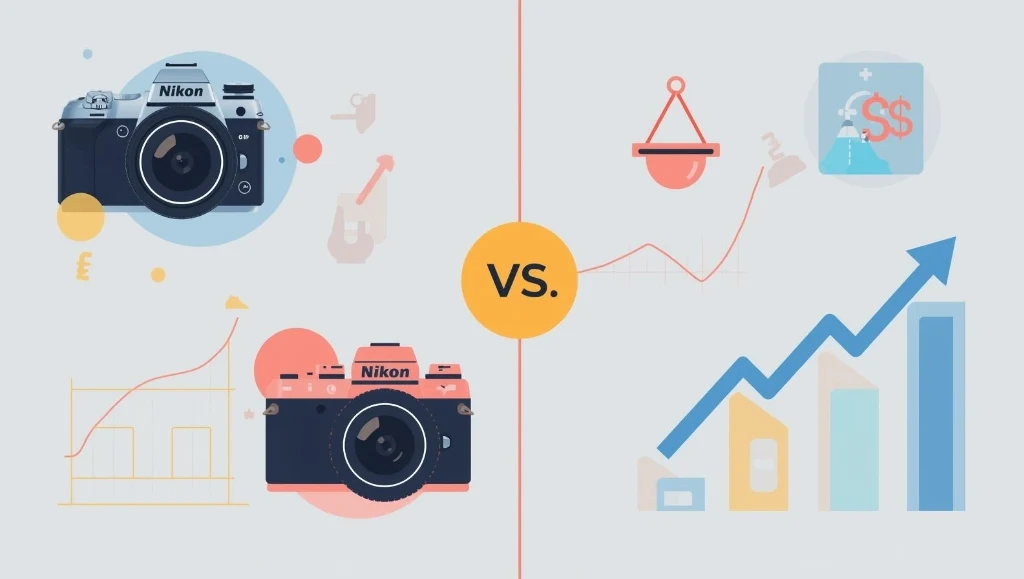
The cost of a camera goes beyond the price tag. You need to think about lenses, gear, and care over time. Nikon and Canon both have good options at every level. Let’s see how they compare
Entry-Level Cameras
If you are just starting, you want a simple and low-cost setup. Both brands offer good beginner kits.
Nikon Picks:
- Nikon D3500 – Easy DSLR for new photographers.
- Nikon Z50 – Mirrorless camera with great low-light shots.
Canon Picks:
- Canon Rebel T7 – Very simple to use, like a phone camera.
- Canon R50 – Compact mirrorless with touchscreen menus.
Price Range: $500 – $900 (with kit lens included)
Canon kits often cost a little less. Nikon feels stronger in the hand and is easier to hold.
Mid-Range Cameras
These cameras fit hobbyists or anyone growing their skills. You get better features without paying pro prices.
Nikon Picks:
- Nikon Z6 III – Great for both photos and video.
- Nikon Z5 – Full-frame at a fair price.
Canon Picks:
- Canon R6 Mark II – Fast focus, perfect for weddings and events.
- Canon R8 – Light and quick for action shots.
Price Range: $1,200 – $2,500 (body only)
Nikon is usually a bit cheaper here. Canon gives better focus and more lens choices.
Pro-Level Cameras
Pro cameras are built tough and handle heavy use. They work well for jobs where every shot matters.
Nikon Picks:
- Nikon Z8 – Top choice for sports and wildlife.
- Nikon D850 – Known for rich detail and sharp images.
Canon Picks:
- Canon R5 Mark II – 8K video and high-resolution photos.
- Canon R5 – Trusted for weddings and commercial work.
Price Range: $3,000 – $4,500 (body only)
Canon costs a bit more but has top video and focus features.
Long-Term Costs
Buying a body is only step one. Lenses and upkeep add up over time.
Lenses:
- Canon has more budget lens options.
- Nikon’s Z lenses are great but can cost more.
Maintenance:
- Both brands need regular sensor cleaning and updates.
- Canon repairs are often faster because there are more service centers.
Warranty & Service
Both Nikon and Canon give a one-year warranty. You can also buy extended plans.
Canon:
- Big service network worldwide.
- Fast parts and repairs.
Nikon:
- Great quality service but slower in smaller areas.
- Gear is rugged and often needs fewer repairs.
Pros and Cons – Nikon vs Canon
Both Nikon and Canon are trusted by photographers worldwide. Each brand has strong points and weak spots. Knowing both will help you choose the best system for your needs.
Nikon
Nikon is known for sharp, natural images. Its cameras are strong and built to handle rough weather. Many wildlife and sports photographers choose Nikon because of its fast shooting speed and powerful telephoto lenses. It also performs well in low-light settings, like nighttime or indoor shoots. On top of that, Nikon’s full-frame cameras are often priced a bit lower, making them a good value.
Still, Nikon has a few downsides. It has fewer low-cost lens choices, especially for its newer Z-mount mirrorless cameras. The autofocus isn’t as quick as Canon’s when tracking fast-moving subjects. Nikon also has a smaller service network, so repairs can take longer in some areas. Some models feel heavier too. A wildlife photographer I know loves Nikon for outdoor work but borrows Canon gear for indoor sports because of Canon’s faster focus.
Canon
Canon shines with its fast and reliable autofocus. It’s perfect for weddings, portraits, and video shoots. Canon also offers a huge range of lenses, from budget-friendly options to top-end pro lenses. Its color science gives smooth skin tones and vibrant images straight from the camera. For video, Canon is a leader, offering 4K and 8K recording on many models. Plus, Canon has a larger global service network, so repairs are often quicker and easier.
On the flip side, Canon cameras and lenses are often more expensive. Some high-end Canon models can heat up during long 8K video sessions. Battery life is usually a bit shorter than Nikon’s DSLRs. Entry-level Canon cameras may also feel less sturdy in tough conditions. A wedding photographer I know swears by Canon for speed and colors, but says the cost of top RF lenses adds up fast.
Bottom Line:
Go with Nikon if you need a tough camera for outdoor shooting and love natural, sharp images.
Choose Canon if you want the best autofocus, smooth colors, and a wide selection of lenses.
Nikon vs Canon Which is Better? (Final Verdict)
This debate has lasted for years. Both brands make great cameras. Each fits a different style and goal. Pick the one that matches how you shoot.
For Beginners
Canon feels easy on day one. Touch menus help, and low-cost lenses keep the bill small. Nikon suits learners who want a stronger grip and clean low-light photos. Start with Canon for a soft landing; switch to Nikon if you plan to dig deeper.
For Professionals
Nikon handles rough trips and bad weather. Wildlife and sports shooters love that. Canon excels at events, portraits, and studio work with fast, sticky autofocus and a huge lens list. Many pros keep both and choose by job.
For Videographers
Canon leads with Dual Pixel AF, smooth 4K/8K, and many video-ready lenses. Nikon’s Z line brings rich color and better heat control on long takes. Creators who need the fastest focus usually pick Canon.
For Wedding Photographers
Canon gives warm skin tones and quick focus for fast moments. Nikon performs well in dim halls and late-night parties. Most wedding teams favor Canon for the mix of speed, color, and lens choice.
Conclusion
Both Nikon and Canon make incredible cameras. The right choice depends on your style, budget, and future goals. Whether you want to capture family moments, film stunning videos, or shoot professional work, both brands can help you create amazing images.
The best way to decide is to try before you buy. Visit a camera store or rent gear for a day. Hold the cameras, test the menus, and see which one feels natural in your hands. Comfort and ease of use are just as important as specs.

